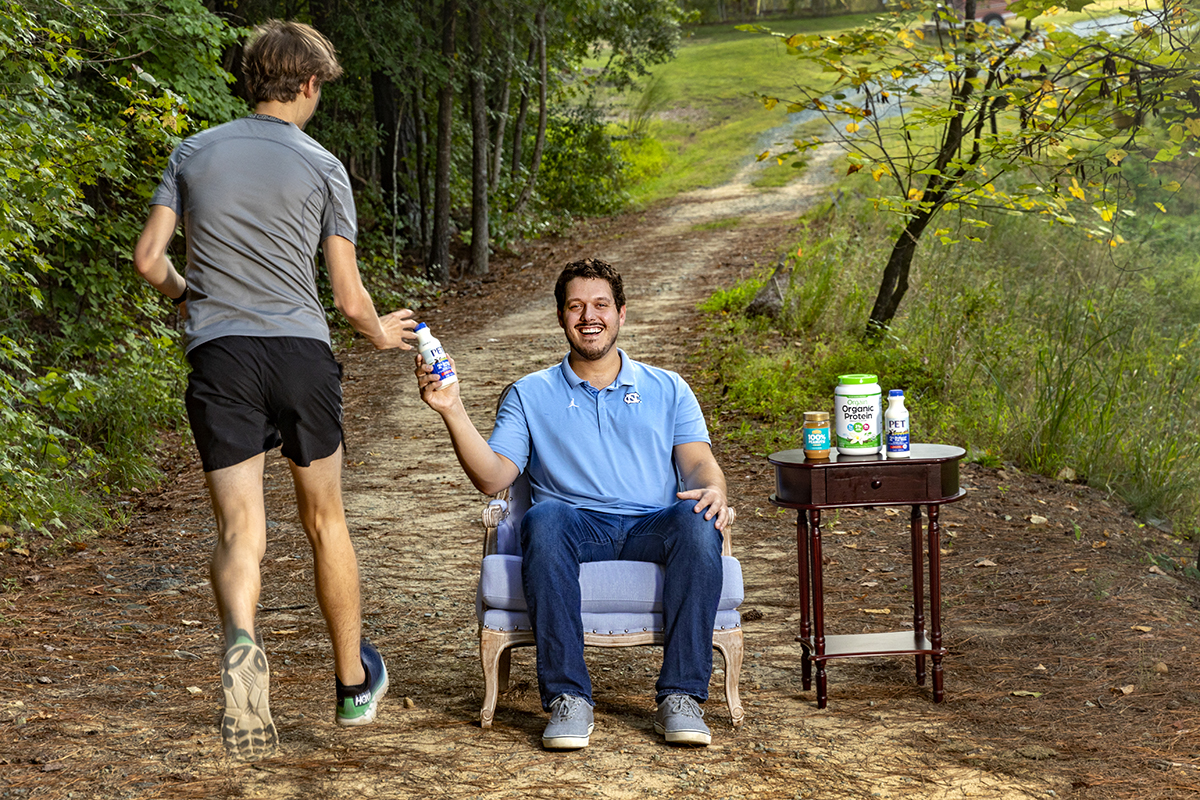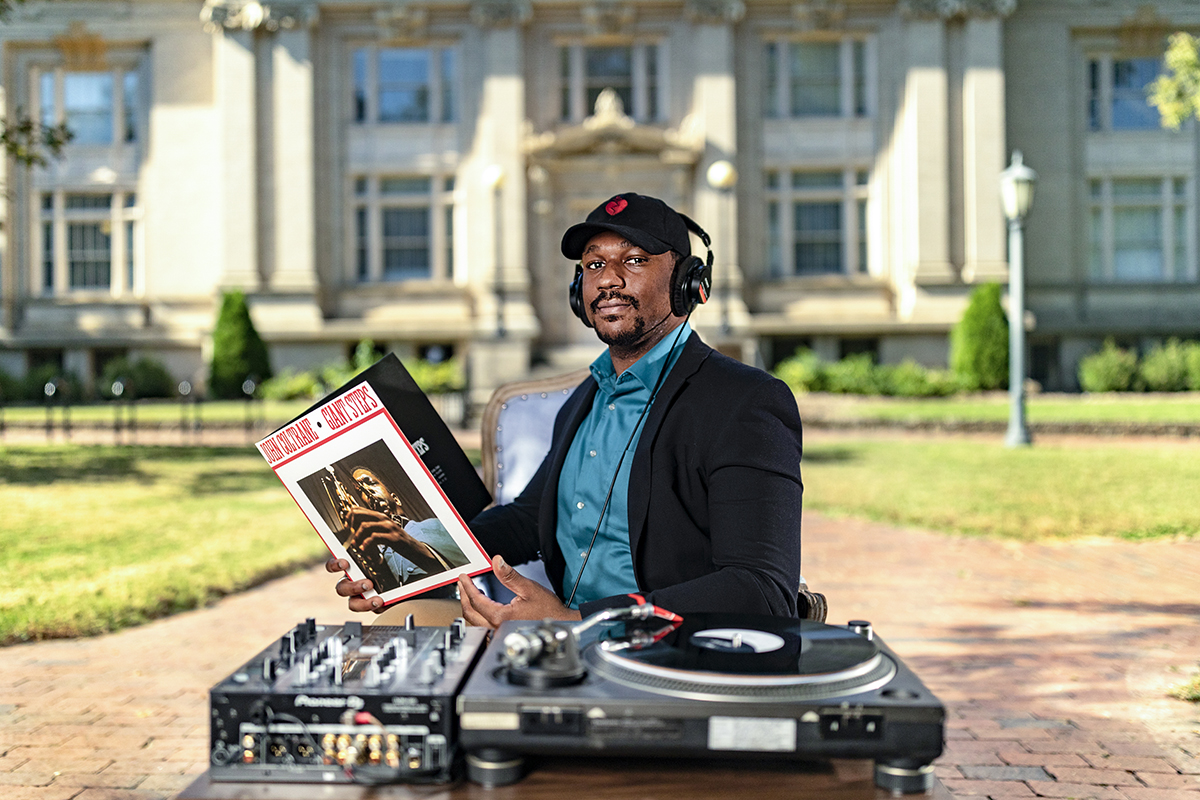Taking a seat with Carolina’s researchers
Pull up a chair and meet a few of Carolina's graduate students who are working to improve the lives of North Carolinians.

Carolina graduate students play a prominent role in carrying out our research mission and ensuring the University serves all North Carolinians.
From helping improve the health of people with diabetes to creating tools that help communities make smarter environmental decisions, graduate students are exploring significant issues and questions.
Pull up a chair and meet the next generation of North Carolina’s leaders.
Franklin Muntis, nutrition
“I have been fascinated by exercise and nutrition for a long time. I chose this particular topic because it explored a unique intersection between my two passions that has the potential to make an impact on the health and well-being of people with Type 1 diabetes.”
As part of Professor Beth Mayer-Davis’ research group in UNC Gillings School of Global Public Health’s Department of Nutrition, Franklin Muntis and his team are investigating nutrition and behavioral strategies that may improve the co-management of diabetes and weight for individuals living with Type 1 diabetes. The researchers are examining the impact pre-exercise and post-exercise protein intake have on glycemic control during and following exercise.
“For people living with Type 1 diabetes, exercise can often cause unpredictable changes in blood sugar and increases the risk of experiencing hypoglycemia for up to 24 hours,” Muntis said. “While consuming more carbohydrates around exercise can reduce the risk of hypoglycemia, for those trying to manage their weight, it can create a feeling of futility as the calories being burned during exercise are being replaced by additional carbohydrate intake.”
Increasing protein intake before and after exercise is a commonly recommended sports nutrition strategy for speeding up recovery and improving performance, but that same protein intake has also been shown to cause a mild, sustained increase in blood sugar. Increasing protein may help mitigate the risk of hypoglycemia and improve overall the delicate glycemic control for people with Type 1 diabetes if consumed around exercise.
“Research in this area is scarce,” Muntis said. “I hope the results of my research will be used to inform exercise nutrition guidelines for people with Type 1 diabetes and aid in the development of nutritional strategies that can empower people with Type 1 diabetes to participate in more regular exercise, thereby improving their health and diabetes management.”
Brea Hampton, genetics
“Have you ever wondered why some people get sick from infections and some people barely notice it? One factor is their genetics. My research focuses on how genetic differences impact the immune system.”
Brea Hampton says that she became a scientist because she loves being at the edge of knowledge.
“Every small discovery that I make in the lab is brand new information that can help solve bigger questions, piece by piece,” she said.
Hampton’s work in the Heise Lab focuses on genomic regions that regulate the immune system. She believes that if researchers can determine what genomic regions control the immune system in health, they can use that information to understand the immune response to infections and diseases.
“While doing something that I love, I’m also challenging the narrative of what a scientist looks like,” said Hampton. “My hope is that as little Black girls see me, they see themselves and know that being a scientist is possible.”
Aldwyn Hogg Jr., music
“My research conceptualizes and frames Black music and sounds about technology from the previous century in the United States as Black sonic technopoetics.”
Through his research, Ph.D. student Aldwyn Hogg Jr. studies with a variety of historical and primary sources of sound to demonstrate that no technology is neutral and free from the effect of power relations in society.
“I chose this topic because I am devoted to revealing the often subtle and taken-for-granted links between race, technology and power within this country,” said Hogg. “I listen to the Black sonic technopoetics of four technologies in four historical periods — the industrial washing machine system in the 1930s, the automobile in the 1930s and ’40s, nuclear weaponry in the 1940-’50s and the Apollo 11 mission to the moon in 1969 — in order to write novel histories of these technologies.”
Black sonic technopoetics employed within his research also include blues songs from Bessie Smith, swing and jazz tunes from Andy Kirk and spoken word pieces from Gil Scott-Heron.
Hogg also draws from various written sources to supplement his findings — from Black newspapers, such as the Chicago Defender, to memoirs and autobiographies from people, including jazz bandleader Duke Ellington. He even researches formerly classified documents like FBI surveillance records of Paul Robeson, a politically-active singer in the 1940s.
“I hope that my research ultimately accomplishes several things. First, I hope it adds to scholarship on race and technology that is committed to dispelling the illusion that technology is neutral,” Hogg said. “Second, I hope that my concept of Black sonic technopoetics widens the gamut of approaches to studying race, technology, music and sound in the United States. Third, I hope it can write Black people into histories of technologies in which they are otherwise absent or hidden.”
Eva Ramirez-Flores, information science
“Environmental justice seeks to repair and end the harm caused by disproportionate environmental burdens placed upon low-wealth communities of color. I aim to further environmental justice goals with data science.”
Ramirez-Flores is channeling her passion for environmental justice into her studies as a first-year master’s student in the UNC School of Information and Library Science.
Earlier this year, Ramirez-Flores developed a story map that cross-referenced the relationship between environmental hazards, such as concentrated animal feeding operations, sanitary sewer overflows and landfills, with communities of color and low wealth. Additional research led to more maps that illustrate the compounding effects of these environmental burdens on those communities.
Ramirez-Flores also works at the Environmental Finance Center through the School of Government, where she is helping to develop and refine the tools and data science used to assist organizations in making sustainable financial and environmental decisions, specifically around issues related to water affordability.
“I hope to support environmental justice directly through my research and through discussions related to those findings I hope to raise awareness of environmental injustices within our communities,” said Ramirez Flores, “As someone I admire once reminded me, ‘If we all do our small part, what a difference it can make.'”








